Low on food, high on nukes: Why is bankrupt Pakistan focused on its nuclear programme amid worst crisis?
Pakistan is facing its worst economic crisis. There's a shortage of food and medicines and Islamabad is struggling to acquire a much-needed IMF bailout. Amid its many woes, the attention of its government remains on the country’s nuclear programme. It will not be compromised, it says
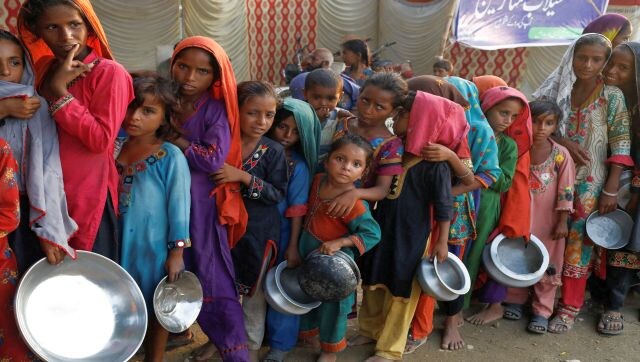
Pakistan's economic crisis has led to skyrocketing prices of food items. The situation has forced people in the country to go hungry. File image/Reuters
The country is reeling from possibly its worst economic crisis, but Pakistan’s priorities have been laid bare going by the prime minister and finance minister’s latest comments.
Instead of focusing on acquiring a bailout from the International Monetary Fund (IMF) to ease the troubles of its common man, the government is focused on its nuclear programme, with Pakistan’s finance minister Ishaq Dar, while responding to a question on the cash crunch, on Thursday said that his government will not compromise anything on the nuclear or the missile program of the country.
But what prompted the Pakistan administration to speak on the issue and what exactly is the country’s nuclear capabilities. We probe deeper and give you all the answers.
What did the ministers say?
On Thursday, Pakistan’s prime minister and finance minister for the first time brought the issue of the nation’s nuclear missiles into the public sphere.
Minister for Finance and Revenue Ishaq Dar said, “I believe in transparency and fiscal discipline… Let me assure you that nobody is (ready) to compromise on the nuclear or missile programme of Pakistan. No way.”
He added that nobody has any right to dictate to “Pakistan what range of missiles and what nuclear weapons it can have; we have to have our own deterrence”.
“We represent the people of Pakistan and we have to guard our national interests,” he added further.
Also read: How Pakistan is following Sri Lanka’s footsteps in China’s debt trap
Hours later, Pakistan’s prime minister’s office, according to Tribune, issued a statement clearing the air about the nuclear programme and its safety. “Pakistan’s nuclear and missile programme is a national asset, which is jealously guarded by the State. The entire program is foolproof and under no stress of pressure whatsoever.”
“It continues to fully serve the purpose for which this capability was developed,” the statement added.
In a tweet later in the day, Prime Minister Shehbaz Sharif said that “misleading speculations about Pakistan’s nuclear and missile programme are unfortunate”.
The misleading speculations about Pakistan’s nuclear & missile program are unfortunate. The stringent, fool-proof & multi-layered security safeguards, duly testified by IAEA, are in place. Our nuclear program represents the unwavering consensus of the nation & is for deterrence.
— Shehbaz Sharif (@CMShehbaz) March 16, 2023
Why now though?
But why did the ministers make these comments now? What prompted them to issue such statements?
Pakistan’s finance minister Ishaq Dar’s comments came in response to Senator Raza Rabbani, former Pakistan Senate chairman and senior Pakistan People’s Party leader, remark that the people of Pakistan had a right to know if the country’s nuclear assets were under pressure. His comments in the Pakistan Senate came in connection to the delay in acquiring the IMF bailout.
Describing the delay as extraordinary, Senator Rabbani had sought to know if the delay was being made because of some sort of pressure on the country’s nuclear programme or its strategic relationship with China or because an imperialist power wanted its presence in the region, the Dawn reported.
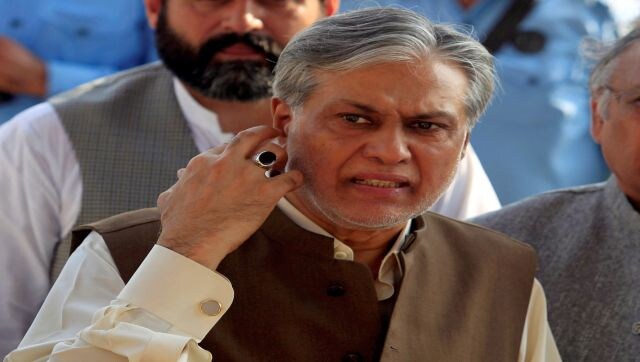
Separately, the PM’s comments were made after press releases, queries and various assertions were made regarding Pakistan’s nuclear and missile programme, including the International Atomic Energy Agency head’s routine visit.
There has been a lot of buzz among Pakistani authorities that there has been a longstanding demand by a Western country to abandon its long-range nuclear missile programme. No one has named the Western power, but speculation has been rife that the US is unhappy with Pakistan’s nuclear capabilities.
In the recent past, Pakistan’s ability to secure its nuclear arsenal has come under a cloud of suspicion. In fact, United States president Joe Biden in October last year had said that Pakistan is “one of the most dangerous nations in the world” as it has “nuclear weapons without any cohesion”.
Interestingly, this isn’t the first time that US presidents have raised concerns about Pakistan’s nuclear stockpiles. A Brookings report has said that since 1998 when Pakistan first began testing nuclear weapons, American leaders have been haunted that Pakistan’s stockpile of nukes would fall into the wrong hands.
This worry has amplified in recent times as Pakistan Taliban gains a stronghold in the country and has been upping its attacks. This fear had been enunciated by former US president Barack Obama: “The single biggest threat to US security, both short term, medium term and long term would be the possibility of a terrorist organisation obtaining a nuclear weapon.”
An economic crisis in the country only intensifies these concerns. As Uzair Younus, the director of the Pakistan Initiative at the Atlantic Council’s South Asia Center, was quoted as saying, “If the economy remains in a moribund state, and there are shortages of goods and energy leading to a political crisis on the streets of major cities, that would also allow the Pakistani Taliban and other terrorist groups to begin hitting at the government more directly. “We could see a significant weakening of the state and its capacity to impose order.”
What are Pakistan’s nuclear capabilities?
So, what exactly does Pakistan’s nuclear arsenal look like? According to a report by Stockholm International Peace Research Institute in 2022, Pakistan holds about 100–120 nuclear weapons, which can be delivered by aircraft and land-based missiles. Compare this to India, who has around 90-110 nuclear weapons.
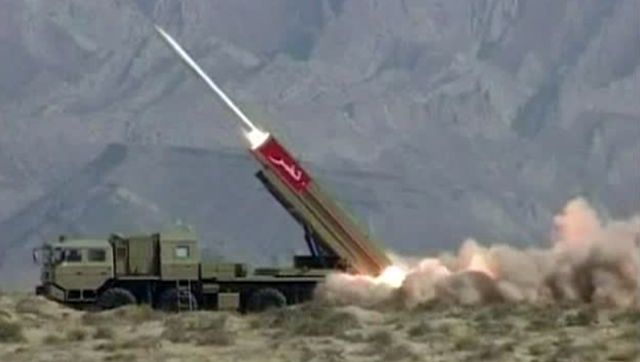
The US-based Arms Control Association has stated that Pakistan’s nuclear delivery systems include at least four short-range and two medium-range ballistic missiles. Several more missiles, including an intercontinental ballistic missile (ICBM) with a range of 7,000 kilometres, are under development.
A Carnegie Endowment for International Peace report has reported that estimates made by Pakistan will become the third-largest nuclear weapon power in 2025, leapfrogging ahead of France, China, and the United Kingdom, behind only the United States and Russia. Others estimate that its growth will make it only the fifth-largest arsenal.
What about Pakistan’s economic conditions?
It’s concerning that Pakistan’s political leadership is discussing its nuclear programme at a time when the common man struggles to eat. The Pakistani rupee has plummeted, the country’s government has raised the price of petrol and diesel to Rs 272 and Rs 293 a litre respectively.
The crisis has led to an acute shortage of medical supplies and medicines and food grains, vegetables and fruits are at unattainable rates. The conditions are so dire that the country faced a shortage of flour, and one person died in Mirpurkhas, Sindh, in a stampede at the sale point of subsidised flour stocks. In January 2023, food inflation reached 42.9 per cent compared to 12.8 per cent last year, leaving millions struggling for their daily meals.
Also read: Pakistan crisis: Can the country be saved from collapse?
In February, Pakistan was on the brink of default. The country’s debt has become unsustainable, said a study by the Asian Development Bank Institute. Ratings agency Fitch has also predicted a gloomy outlook, downgrading Pakistan’s rating to CCC – and said inflation could touch 33 per cent in the next few months.
Amid this situation, Pakistan has been negotiating hard with the IMF for a $1.1 billion bailout. The IMF has set tough conditions for the country, including boosting the low tax base, ending tax exemptions for the export sector, and raising petrol, electricity and gas prices. It is also pushing for Pakistan to keep a sustainable amount of US dollars in the bank through guarantees of further support from friendly nations Saudi Arabia, China and the UAE, as well as the World Bank.
Unsurprisingly, the negotiations have left Pakistan soured, with officials grumbling, as per a Dawn report, “We are members of the IMF, not beggars or else our membership be discarded.”
With inputs from agencies
Read all the Latest News, Trending News, Cricket News, Bollywood News,
India News and Entertainment News here. Follow us on Facebook, Twitter and Instagram.
also read
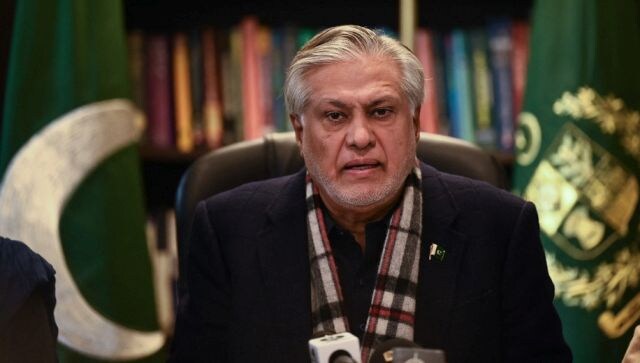
Hopeful of signing bailout deal with IMF this week, says Pakistan finance minister Ishaq Dar
Dar vowed on Thursday that the government was "absolutely committed" to completing the current USD 7 billion bailout programme with the IMF, once again indicating that the cash-strapped country could sign the staff-level agreement with the global lender this week

Pakistan Economic Crisis: Rising poverty, gun culture drive Pakistanis to violent crimes
While foreign aid had prevented Pakistan from suffering an economic crisis in the past, the current situation is different as the International Monetary Fund (IMF) imposing a host of tough conditions before considering a financial bailout
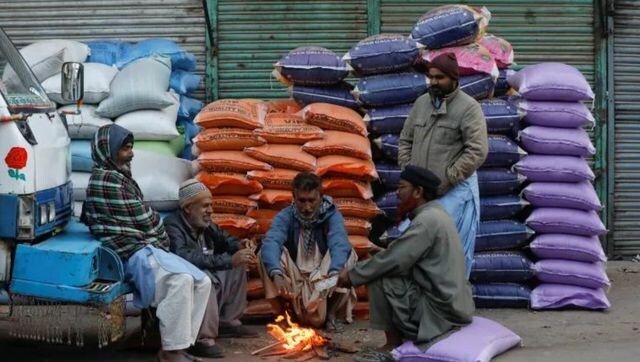
Bankrupt Pakistan to beg US to push for stalled IMF bailout package
Pakistan Finance Minister Ishaq Dar is expected to talk to the US envoy and there is a possibility of a staff-level agreement between Pakistan and IMF later this week
